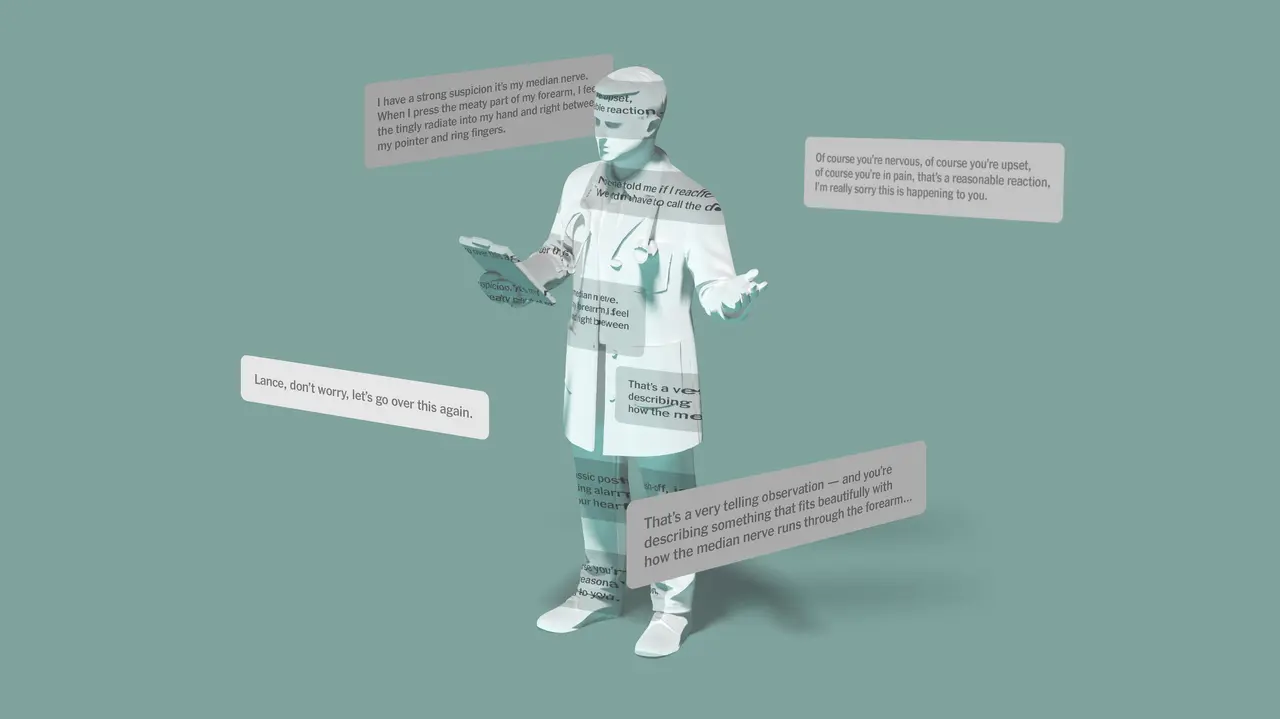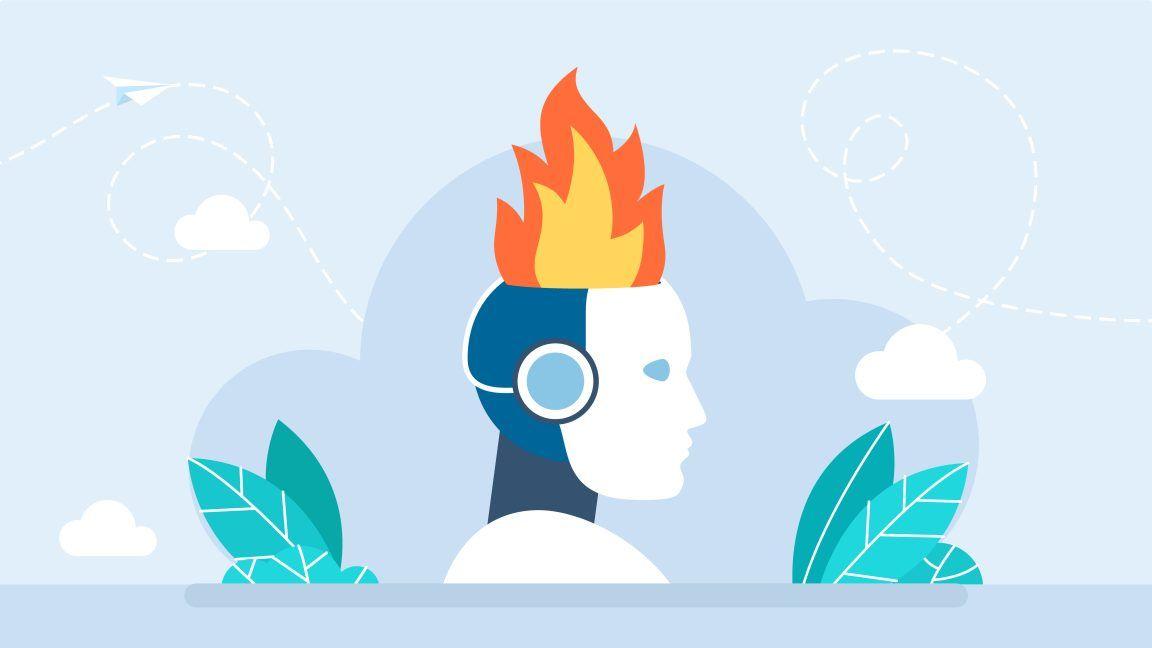The Perils of Dr. Google: Navigating Online Medical Advice in the Age of AI
5 Sources
5 Sources
[1]
What's that rash? Put some thought into asking Google for medical help
Dr. Google is often on call for worried patients, but it may not give the best advice. Doctors say internet searches for medical information should be done cautiously, especially with artificial intelligence playing a growing role. Information from the right websites can teach patients about symptoms and prepare them for a doctor's visit. But a poorly done search might inflame anxiety well before someone reaches the waiting room. It's important to know the source of the information you find and to avoid trying to diagnose your health issue. Here are questions to keep in mind if you seek medical help online. When you do a search, don't automatically click the first link. It may not contain the best answers. Some companies pay to have their websites listed at the top of a results page. Those links may be listed as sponsored. Scroll for results that come from a source you can trust for medical information. That can include big health systems like the Mayo Clinic or sites run by government agencies like the Centers for Disease Control and Prevention. "We've gotten so used to clicking on that first link," says John Grohol, a psychologist who specializes in online behavior. "For your health information, especially when it is personal, you want to think about it." That depends on what it tells you. More people are using artificial intelligence to get quick answers pulled from a variety of internet sources. Some searches also will generate an AI summary at the top of the results page. But an AI answer may not say where it got the information. That makes it hard to judge credibility. AI also can be prone to " hallucinations," an industry term for issues that cause the technology to make stuff up. Be especially wary of this if no source is cited. How you phrase a question plays a big role in the results you see. Doctors say patients should search for information based on symptoms, not an expected diagnosis. "You've got to ask at the very beginning the right questions," said Dr. Eric Boose of the Cleveland Clinic. That means asking, "What could cause a lump to form under my skin?" instead of "Is the lump under my skin cancer?" Focusing on a diagnosis means you may miss other explanations, especially if you just click the first few links listed in the results. For some issues, you should skip the search altogether. If you are having chest pains, experiencing dizziness of showing signs of a stroke, seek help immediately. "You don't want to delay something that should be treated within a certain amount of time," said Dr. Olivier Gherardi, medical director of Brown University Health Urgent Care. No. Leave that to the real doctors who are trained to ask questions that lead to a diagnosis. Blood in your urine could mean cancer. It also might be caused by kidney stones or an infection. Unexplained weight loss also could be a sign of cancer. Or it could reflect an overactive thyroid or a new job that causes you to move around more. Some testing and a visit with a doctor who knows your medical history may be the best medicine in these situations. "There are a lot of symptoms that overlap between minor conditions and major medical problems," said Dr. Sarah Sams, a board member with the American Academy of Family Physicians. ____ The Associated Press Health and Science Department receives support from the Howard Hughes Medical Institute's Science and Educational Media Group. The AP is solely responsible for all content.
[2]
Beware Dr Google: How to use the Internet wisely to get medical advice
Doctors say Internet searches for medical information should be undertaken with caution. Here's guidance on what to look out for when you do turn to Google. Dr Google is often on call for worried patients, but it may not give the most sound advice. Doctors say Internet searches for medical information should be done cautiously, especially with the growing role of artificial intelligence (AI). Information from the right websites can teach patients about symptoms and prepare them for a doctor's visit. But a poorly done search might inflame anxiety well before someone reaches the waiting room. It's important to know the source of the information you find and to avoid trying to diagnose your health issue. Here are questions to keep in mind if you seek medical help online. When you do a Google search, don't automatically click the first link. It may not contain the best answers. Some companies pay to have their websites listed at the top of a results page. Those links may be listed as sponsored. Scroll for results that come from a source you can trust for medical information,** such as sites run by government agencies like the European Centre for Disease Prevention and Control (ECDC) or a country's national health service. "We've gotten so used to clicking on that first link," says John Grohol, a psychologist who specialises in online behaviour. "For your health information, especially when it is personal, you want to think about it," he said. That depends on what it tells you. More people are using AI to get quick answers pulled from a variety of Internet sources. Some searches also will generate an AI summary at the top of the results page. But an AI answer may not say where it got the information. That makes it hard to judge credibility. AI also can be prone to "hallucinations," an industry term for issues that cause the technology to make stuff up. Be especially wary of this if no source is cited. How you phrase a question plays a big role in the results you see. Doctors say patients should search for information based on symptoms, not an expected diagnosis. "You've got to ask at the very beginning the right questions," said Dr Eric Boose of the US-based Cleveland Clinic. That means asking, "What could cause a lump to form under my skin?" instead of "Is the lump under my skin cancer?" Focusing on a diagnosis means you may miss other explanations, especially if you just click the first few links listed in the results. For some issues, you should skip the search altogether. If you are having chest pains, experiencing dizziness, or showing signs of a stroke, seek help immediately. "You don't want to delay something that should be treated within a certain amount of time," said Dr Olivier Gherardi, medical director of Brown University Health Urgent Care in the US. No. Leave that to the real doctors who are trained to ask questions that lead to a diagnosis. "There are a lot of symptoms that overlap between minor conditions and major medical problems," said Dr Sarah Sams, a board member with the American Academy of Family Physicians. Blood in your urine could mean cancer. It also might be caused by kidney stones or an infection. Unexplained weight loss could also be a sign of cancer. Or it could reflect an overactive thyroid or a new job that causes you to move around more. In all these situations, some testing and a visit with a doctor who knows your medical history may be the best medicine.
[3]
What's that rash? Put some thought into asking Google for medical help
Dr. Google is often on call for worried patients, but it may not give the best advice Dr. Google is often on call for worried patients, but it may not give the best advice. Doctors say internet searches for medical information should be done cautiously, especially with artificial intelligence playing a growing role. Information from the right websites can teach patients about symptoms and prepare them for a doctor's visit. But a poorly done search might inflame anxiety well before someone reaches the waiting room. It's important to know the source of the information you find and to avoid trying to diagnose your health issue. Here are questions to keep in mind if you seek medical help online. When you do a search, don't automatically click the first link. It may not contain the best answers. Some companies pay to have their websites listed at the top of a results page. Those links may be listed as sponsored. Scroll for results that come from a source you can trust for medical information. That can include big health systems like the Mayo Clinic or sites run by government agencies like the Centers for Disease Control and Prevention. "We've gotten so used to clicking on that first link," says John Grohol, a psychologist who specializes in online behavior. "For your health information, especially when it is personal, you want to think about it." That depends on what it tells you. More people are using artificial intelligence to get quick answers pulled from a variety of internet sources. Some searches also will generate an AI summary at the top of the results page. But an AI answer may not say where it got the information. That makes it hard to judge credibility. AI also can be prone to " hallucinations," an industry term for issues that cause the technology to make stuff up. Be especially wary of this if no source is cited. How you phrase a question plays a big role in the results you see. Doctors say patients should search for information based on symptoms, not an expected diagnosis. "You've got to ask at the very beginning the right questions," said Dr. Eric Boose of the Cleveland Clinic. That means asking, "What could cause a lump to form under my skin?" instead of "Is the lump under my skin cancer?" Focusing on a diagnosis means you may miss other explanations, especially if you just click the first few links listed in the results. For some issues, you should skip the search altogether. If you are having chest pains, experiencing dizziness of showing signs of a stroke, seek help immediately. "You don't want to delay something that should be treated within a certain amount of time," said Dr. Olivier Gherardi, medical director of Brown University Health Urgent Care. No. Leave that to the real doctors who are trained to ask questions that lead to a diagnosis. Blood in your urine could mean cancer. It also might be caused by kidney stones or an infection. Unexplained weight loss also could be a sign of cancer. Or it could reflect an overactive thyroid or a new job that causes you to move around more. Some testing and a visit with a doctor who knows your medical history may be the best medicine in these situations. "There are a lot of symptoms that overlap between minor conditions and major medical problems," said Dr. Sarah Sams, a board member with the American Academy of Family Physicians. ____ The Associated Press Health and Science Department receives support from the Howard Hughes Medical Institute's Science and Educational Media Group. The AP is solely responsible for all content.
[4]
What's that rash? Put some thought into asking Google for medical help
Dr. Google is often on call for worried patients, but it may not give the best advice. Doctors say internet searches for medical information should be done cautiously, especially with artificial intelligence playing a growing role. Information from the right websites can teach patients about symptoms and prepare them for a doctor's visit. But a poorly done search might inflame anxiety well before someone reaches the waiting room. It's important to know the source of the information you find and to avoid trying to diagnose your health issue. Here are questions to keep in mind if you seek medical help online. What's your source? When you do a search, don't automatically click the first link. It may not contain the best answers. Some companies pay to have their websites listed at the top of a results page. Those links may be listed as sponsored. Scroll for results that come from a source you can trust for medical information. That can include big health systems like the Mayo Clinic or sites run by government agencies like the Centers for Disease Control and Prevention. "We've gotten so used to clicking on that first link," says John Grohol, a psychologist who specializes in online behavior. "For your health information, especially when it is personal, you want to think about it." More people are using artificial intelligence to get quick answers pulled from a variety of internet sources. Some searches also will generate an AI summary at the top of the results page. But an AI answer may not say where it got the information. That makes it hard to judge credibility. AI also can be prone to " hallucinations," an industry term for issues that cause the technology to make stuff up. Be especially wary of this if no source is cited. What should I ask? How you phrase a question plays a big role in the results you see. Doctors say patients should search for information based on symptoms, not an expected diagnosis. "You've got to ask at the very beginning the right questions," said Dr. Eric Boose of the Cleveland Clinic. That means asking, "What could cause a lump to form under my skin?" instead of "Is the lump under my skin cancer?" Focusing on a diagnosis means you may miss other explanations, especially if you just click the first few links listed in the results. For some issues, you should skip the search altogether. If you are having chest pains, experiencing dizziness of showing signs of a stroke, seek help immediately. "You don't want to delay something that should be treated within a certain amount of time," said Dr. Olivier Gherardi, medical director of Brown University Health Urgent Care. Can the internet diagnose a problem? No. Leave that to the real doctors who are trained to ask questions that lead to a diagnosis. Blood in your urine could mean cancer. It also might be caused by kidney stones or an infection. Unexplained weight loss also could be a sign of cancer. Or it could reflect an overactive thyroid or a new job that causes you to move around more. Some testing and a visit with a doctor who knows your medical history may be the best medicine in these situations. "There are a lot of symptoms that overlap between minor conditions and major medical problems," said Dr. Sarah Sams, a board member with the American Academy of Family Physicians. ____ The Associated Press Health and Science Department receives support from the Howard Hughes Medical Institute's Science and Educational Media Group. The AP is solely responsible for all content.
[5]
What's That Rash? Put Some Thought Into Asking Google for Medical Help
Dr. Google is often on call for worried patients, but it may not give the best advice. Doctors say internet searches for medical information should be done cautiously, especially with artificial intelligence playing a growing role. Information from the right websites can teach patients about symptoms and prepare them for a doctor's visit. But a poorly done search might inflame anxiety well before someone reaches the waiting room. It's important to know the source of the information you find and to avoid trying to diagnose your health issue. Here are questions to keep in mind if you seek medical help online. What's your source? When you do a search, don't automatically click the first link. It may not contain the best answers. Some companies pay to have their websites listed at the top of a results page. Those links may be listed as sponsored. Scroll for results that come from a source you can trust for medical information. That can include big health systems like the Mayo Clinic or sites run by government agencies like the Centers for Disease Control and Prevention. "We've gotten so used to clicking on that first link," says John Grohol, a psychologist who specializes in online behavior. "For your health information, especially when it is personal, you want to think about it." More people are using artificial intelligence to get quick answers pulled from a variety of internet sources. Some searches also will generate an AI summary at the top of the results page. But an AI answer may not say where it got the information. That makes it hard to judge credibility. AI also can be prone to " hallucinations," an industry term for issues that cause the technology to make stuff up. Be especially wary of this if no source is cited. What should I ask? How you phrase a question plays a big role in the results you see. Doctors say patients should search for information based on symptoms, not an expected diagnosis. "You've got to ask at the very beginning the right questions," said Dr. Eric Boose of the Cleveland Clinic. That means asking, "What could cause a lump to form under my skin?" instead of "Is the lump under my skin cancer?" Focusing on a diagnosis means you may miss other explanations, especially if you just click the first few links listed in the results. For some issues, you should skip the search altogether. If you are having chest pains, experiencing dizziness of showing signs of a stroke, seek help immediately. "You don't want to delay something that should be treated within a certain amount of time," said Dr. Olivier Gherardi, medical director of Brown University Health Urgent Care. Can the internet diagnose a problem? No. Leave that to the real doctors who are trained to ask questions that lead to a diagnosis. Blood in your urine could mean cancer. It also might be caused by kidney stones or an infection. Unexplained weight loss also could be a sign of cancer. Or it could reflect an overactive thyroid or a new job that causes you to move around more. Some testing and a visit with a doctor who knows your medical history may be the best medicine in these situations. "There are a lot of symptoms that overlap between minor conditions and major medical problems," said Dr. Sarah Sams, a board member with the American Academy of Family Physicians. ____ The Associated Press Health and Science Department receives support from the Howard Hughes Medical Institute's Science and Educational Media Group. The AP is solely responsible for all content. Copyright 2025 The Associated Press. All rights reserved. This material may not be published, broadcast, rewritten or redistributed.
Share
Share
Copy Link
As more people turn to the internet for medical information, doctors warn about the risks of relying on online searches and AI-generated health advice. This story explores the best practices for seeking medical information online and the potential pitfalls to avoid.

The Rise of Online Medical Searches
In an era where information is at our fingertips, more and more people are turning to the internet for medical advice. The phenomenon of "Dr. Google" has become increasingly common, with patients often consulting search engines before or instead of medical professionals. However, doctors are urging caution, especially as artificial intelligence (AI) begins to play a larger role in providing health information online
1
.The Benefits and Risks of Online Health Information
While the internet can be a valuable resource for learning about symptoms and preparing for doctor visits, it also carries significant risks. A poorly executed search can unnecessarily heighten anxiety and lead to misdiagnosis. Dr. Eric Boose of the Cleveland Clinic emphasizes the importance of approaching online searches with caution: "You've got to ask at the very beginning the right questions"
2
.Best Practices for Online Medical Searches
Experts recommend several strategies for effectively using the internet for medical information:
-
Choose Reliable Sources: Scroll past sponsored links and focus on trusted sources such as reputable health systems or government agencies like the Centers for Disease Control and Prevention
3
. -
Phrase Questions Carefully: Focus on symptoms rather than suspected diagnoses. For example, ask "What could cause a lump under my skin?" instead of "Is this lump cancer?"
4
. -
Be Wary of AI-Generated Answers: While AI can provide quick summaries, it may not cite sources, making it difficult to judge credibility. Be especially cautious of AI "hallucinations" – instances where the technology generates inaccurate information
5
.
The Limitations of Online Diagnosis
It's crucial to understand that the internet cannot replace professional medical diagnosis. Dr. Sarah Sams, a board member with the American Academy of Family Physicians, notes, "There are a lot of symptoms that overlap between minor conditions and major medical problems"
1
. Symptoms like blood in urine or unexplained weight loss could indicate various conditions, ranging from minor to serious, and require professional evaluation.Related Stories
When to Seek Immediate Medical Attention
For certain symptoms, it's advisable to skip the internet search altogether and seek immediate medical help. Dr. Olivier Gherardi, medical director of Brown University Health Urgent Care, warns, "You don't want to delay something that should be treated within a certain amount of time"
2
. This includes symptoms such as chest pain, dizziness, or signs of a stroke.The Role of AI in Medical Information
As AI continues to evolve, its role in providing medical information is growing. However, psychologist John Grohol, who specializes in online behavior, advises users to think critically about the information they receive, especially when it comes to personal health matters
3
. The lack of source citations and the potential for AI "hallucinations" make it essential to verify information with reliable sources or healthcare professionals.References
Summarized by
Navi
Related Stories
Recent Highlights
1
SpaceX acquires xAI in $1.25 trillion merger, plans 1 million satellite data centers in orbit
Business and Economy

2
EU launches formal investigation into Grok over sexualized deepfakes and child abuse material
Policy and Regulation

3
SpaceX files to launch 1 million satellites as orbital data centers for AI computing power
Technology








